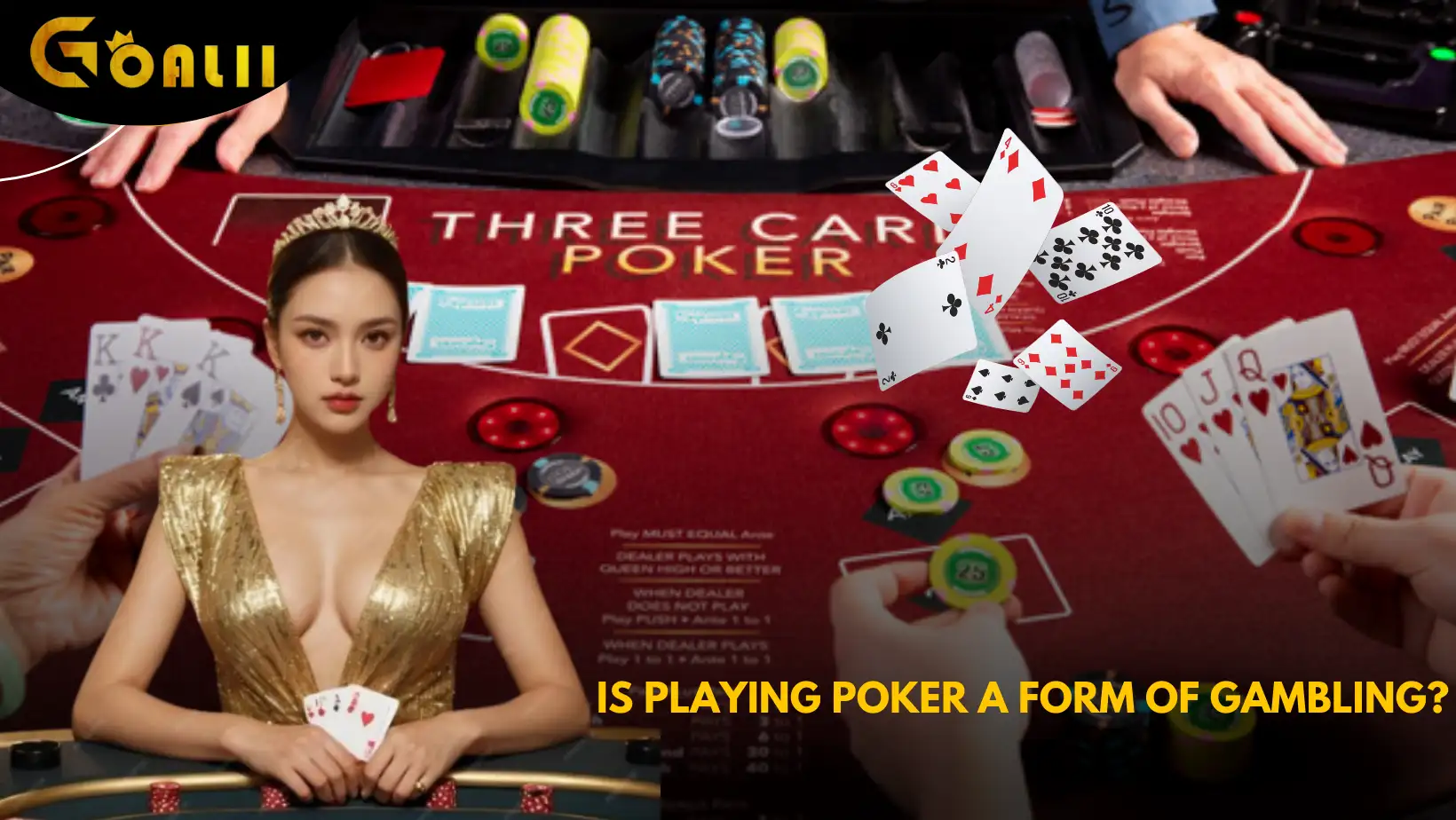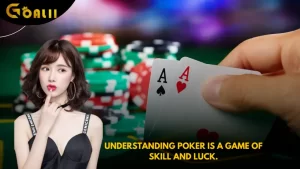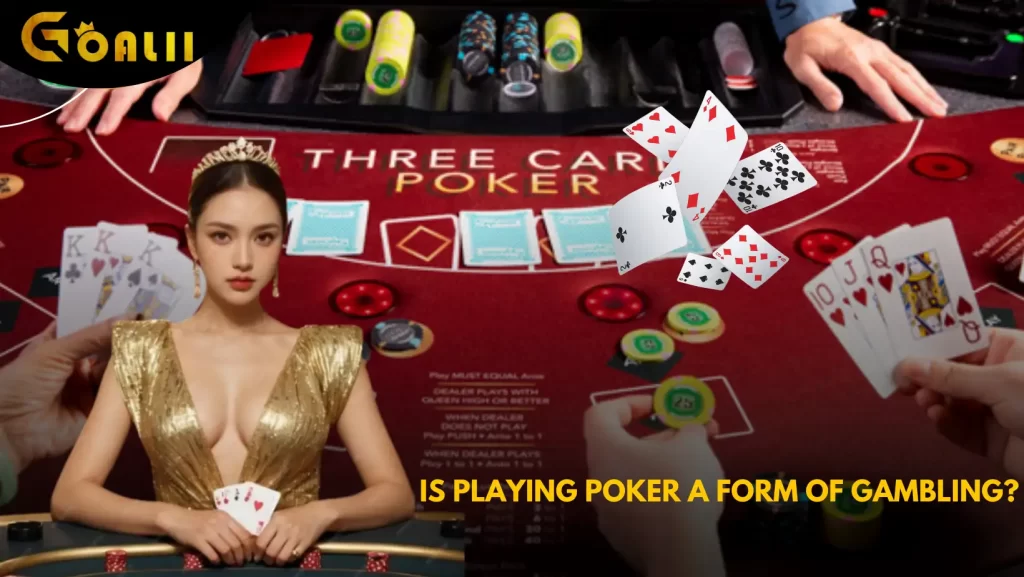Is playing poker a form of gambling? Poker has been argued for decades between being either a form of gambling, or just a game of skill. The distinction between the two may well affect how players approach a game and frame their thinking in terms of risk-reward.
In this article, we shall dig deeper into what poker a form of gambling can be, how far it is connected with gambling, and how a change in your mind can make all the difference in fun and success at the table.
Gambling might reasonably be described as risking money or other assets at unfavorable odds. It is particularly associated with activities in which the risk taking element is deemed to be exciting in some way.

Well, many poker players are not very good and only play for the sake of entertainment. They will, on average, lose money but enjoy the thrill of possibly losing money. Such people who may very well be termed gamblers.
At the professional level, though, poker players aren’t really gamblers – because they’re risking money at favorable odds. Their mathematical expectation of winning is positive, because they are considerably more skilled on the whole than their opponents.
Understanding poker is a game of skill and luck.

At a core level, poker is a card game that pits players against one another in such a way that chips or cash can be won through making the best hand or by convincing others to fold. The combination of skill and luck places poker in an extremely different sphere from most casino games, such as slot machines or roulette, in which outcomes in most games depend on pure chance.
The Skill Factor
Poker involves vast knowledge of strategies, psychology, and probability. A player needs to possess the following skills:
- Math Skills: One needs to calculate the odds and assess possible outcomes to make responsible decisions in making bets.
- Psychological Skills: Reading opponents and recognizing their betting patterns yield significant advantages.
- Strategic Thinking: One must think of a game plan and adjust it according to the moves of one’s opponents.
What separates the professionals from the beginners is the calculated decision-making process, not only with the cards that one is holding but also with the behavior of others. It is for this skill component that many experienced players actually see poker not as much as a gamble but rather as a competitive challenge.
The Chance Element
While skill may play a pivoting role in poker, chance cannot be eliminated. The randomness of the card distribution can allow even the best of players to be on a losing streak. It is this component of chance that places poker a form of gambling within the spectrum of gambling. But again, the realization of this factor helps players keep their expectations in check.
Shifting Mindset – From Gambling to Strategy
Is poker a form of gambling? Poker Should Be Recognized as a Skill Game
Changing your mindset about poker begins with deciding in your mind that poker is not all about luck. Players looking to improve their strategy and increase their chances of success can focus on the skill components of the game. It makes a great deal of difference in the way you approach a game when you consider poker to be competitive with other players and not a game against a house.
Embracing the Learning Process Every hand has a lesson to be learned and improved upon. There is no need to keep track of immediate wins or losses; instead, focus on the process of analyzing your decisions and outcomes further, seeking feedback, and continually refining your skills. Such a growth mindset enables building resilience and adaptability necessary hallmarks for any successful player.
Setting Realistic Expectations
Being prepared for the fact that poker is a game full of variance is very important to your mental well-being. Even the best players go on swings. Lowering your expectations about results will take some pressure off and enable you to enjoy the game without the psychological burden brought on with unrealistic financial goals. You must acknowledge that you are going to take some beats along the way and focus on the quality of your play.
Cultivating a Positive Attitude
So, is poker a form of gambling? A positive mindset will also greatly affect how you will feel about poker in general. Make a conscious decision to enjoy the game, the company of other players, and the satisfaction of realizing you are getting better. Being part of a supportive poker community will also make a difference in enjoying poker more and helping you through tough times.
In the long term, poker is a game of skill period. In the short term, a player’s success depends a lot upon luck. Professional poker players decrease reliance on luck simply because they are continuously making better mathematical decisions.

Let’s say you want to play poker and be profitable over the long term. For that, you’re going to have to employ a poker strategy which includes knowing how to maximize your hand, observing other players’ betting patterns, and making a game-time decision for whether or not they’re bluffing.
If you are looking for proof that poker is a game of skill, then you don’t have to look any further than the top poker players in the world. As it so happens, while a few poker players have amassed incredible fortunes through pure luck, most of the highest-earning poker stars have done it through years of dedication and a string of dazzling performances in the game.
Even when two equally skilled players are playing in the same game at the same stakes, for example, one might play 1,000 hands at those stakes and end up anywhere from extremely unlucky to extremely lucky.
Obviously, the level of stakes players compete in is relevant; nonetheless, you can come across outstanding playing at low stakes and average ones at the highest stakes. Then, the private games diverge from those happening in licensed poker rooms pretty much like live poker diverges from online poker; plus, full ring games are different from short-handed ones.
The estimates are that 80-85% of regulars are losers in No-limit poker games at $1/$2 or $2/$4 stakes over the long term. The problem is linked to natural variance (“luck”) inherent in the game, as well as several other factors. Among them are rake per hand frequently along with a poor beat jackpot. To win 1 or 2 BB/hour on a regular schedule, even for a fairly experienced player in cash game activities, is just not realistic.
It is within the mid-stakes and high stakes where the professionals seem to appear. The range of these stakes goes upwards from two dollars/ five dollars to ten/twenty dollars and upwards, with long-term winners consisting of ten to fifteen percent of the regulars.
Read more: Earn Cash Back & Exciting Invitation Rewards At GOGOJILI
Conclusion about Is poker a form of gambling
While is poker a form of gambling, it is indeed much more than mere chance, with various elements of skill and strategy incorporated. It is all about changing the mindset to incorporate complexities so that instead of ‘gambling’, the focus becomes skills development and the process, per se. This understanding will elevate one’s experience of poker at GOGOJILI Casino and beyond, whether one is a novice or an experienced player.
The right state of mind will enable you to change how you look at poker from simply being a gamble to a strategic activity that involves thrill, challenge, and personal development.

Hello everyone, I’m Maria Reyes, a betting expert with over 6 years of experience in the online casino world! I’m the CEO & Founder of GOGOJILI.COM, launched in February 2020, with a mission to bring exclusive promotions and top-notch thrills to Filipino players. Plus, we’re the official first-level agent site recognized by the GOGOJILI betting platform. A heartfelt thank you to all for your support, I’m thrilled to welcome you to our site!

